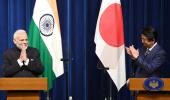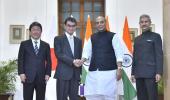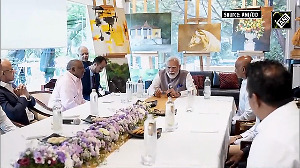There is nothing to be worried about as bilateral ties are robust with solid foundations.
Both are on the same page on the economic and defence/security ties bilaterally and globally and that shall continue irrespective of change in political dispensation in either country, points out Dr Rajaram Panda.

Japanese politics has entered into a phase of political instability following the worst performance by the long-time ruling party, the Liberal Democratic Party (LDP) and its coalition partner the Komeito, in 15 years in the snap polls on October 27 called by Prime Minister Shigeru Ishiba barely a month after coming to office.
As it transpired, it was an ill-conceived move and showed that Ishiba failed to judge the public mood.
Now Ishiba is under pressure to resign. The spectre of a phase of political instability in the horizon now shall have impact in both domestic and foreign policy of Japan, though sector wise, the impact shall is minimal.
As things stand at present, the political situation in Japan is now highly uncertain. The LDP is one of the democratic world's most successful political parties, a one-size-fits-all electoral machine in power for all but four of the last 69 years.
But in the snap polls the LDP and its junior coalition partner Komeito fell short of a majority for the first time since 2009 at the hands of voters angry at a slush fund scandal.
As no party secured a majority, a lot of negotiations, bargaining and compromises are going to be seen in the coming days which is mandated by the rules to cobble up coalition partners to form a government.
Ishiba who won the LDP presidential race on September 27 and thereby became the prime minister hoped to consolidate his position amid public outrage over a political funding scandal and rising living costs. As it transpired, his gamble backfired.
The ruling coalition won just 215 seats, short of the 233 needed for a majority. The LDP's seats in the lower chamber plunged from 247 before the election to 191, a staggering loss of 56 seats.
For the LDP, which has dominated Japan's post-war politics, it was the worst showing since 2009, when the party lost power for four years.
The Japanese political system is indeed entering a new and uncertain period.
Its coalition partner Komeito did not fare better either.
Komeito also incurred a significant loss of eight seats, down to 24, making the combined total for both parties 215, which are 18 seats short of the majority threshold of 233.
The Constitutional Democratic Party of Japan (CDP) and the Democratic Party for the People (DPP) won big in the snap polls.
The smaller DPP did particularly well, quadrupling its seats and solidifying its position as a potential coalition partner -- and possible kingmaker.
But the DPP's choice of partner or partners remained an open question.
The CDP, Japan's largest Opposition party, ended up with 148 seats in the 465-seat Lower House -- 50 more than the 98 it held before the Lower House was dissolved on October 9.
While the CDP had been expected to increase its total, the DPP, which had only seven seats previously, did much better than expected; it clinched 28 seats, four more than the number Komeito ended up with.
This dramatic loss of majority in the Lower House, for the first time in 15 years, did not deter Ishiba from declaring his intention to remain in office.
While admitting the severe security and economic environment that the country faces, he was unprepared to accept 'any stagnation in national politics/'.
But continuing the administration without regaining the public's trust would be a tall order.

Interestingly, a record 73 women were elected to the Lower House in the snap polls, making up about 16% of the membership of the chamber, though the percentage remains way below a global average of 27%.
A total of 314 women ran in the election, accounting for some 23% of candidates.
Although a record high, it still fell short of the government's goal of having 35% of Lower House election candidates composed of women by 2025.
The political volatility and spectre of instability can be foreseen as the Opposition despite making considerable inroads is too divided to form a government.
Many Opposition parties ranging from the Communists to far-right groups have ruled out joining a coalition with the LDP and Komeito. This complicates the path forward.
The LDP and Komeito may try to form a minority government, relying on smaller, centre-right parties like the Democratic Party for the People and the Innovation Party, to pass legislation on a case-by-case basis.
Such an ad-hoc arrangement does not guarantee political stability and the government would always be vulnerable to collapse if it fails to meet Opposition demands.
History shows that the LDP could resort to more unorthodox tactics to secure a majority.
For example, when the party failed to win a majority in a 1996 Lower House election, Hiromu Nonaka, the LDP acting secretary-general, poached lawmakers from the Opposition New Frontier Party and 'regained' a single-party majority.
In the present context, a second alternative is to expand the coalition to include a new party.
Within the LDP, Nippon Ishin, the second largest Opposition party, and the DPP, the third largest, have been floated as a potential junior partner.
But becoming a third ruling coalition member would be tantamount to a betrayal of voters who cast ballots for them.
Still, the LDP made a surprise move to return to power in 1994, a year after its uninterrupted rule since its founding in 1955 ended.
The LDP formed a coalition government with its long-time rival Japan Socialist Party, the predecessor of the Social Democratic Party, and New Party Sakigake by installing JSP leader Tomiichi Murayama as prime minister.

The main Opposition Constitutional Democratic Party of Japan could forge a coalition of its own to replace the LDP-Komeito government.
For example, the CDP, Nippon Ishin, the DPP, Reiwa Shinsengumi, the Japanese Communist Party and the Social Democratic Party, plus independent Lower House members close to the Opposition, hold a combined 238 seats.
But the Opposition parties have divergent views on a broad range of policy issues.
In 1993, the LDP was ousted from power by an eight-party coalition government led by Prime Minister Morihiro Hosokawa, founder of the Japan New Party.
However, the coalition splintered in eight months due to difficult policy coordination among the eight parties.
Current Prime Minister Ishiba has suddenly become politically weak as many Ishiba and Abe allies lost their seats after being implicated in the slush fund scandal.
Elections to the Upper House are due in July 2025 and that would make Ishiba's position more vulnerable as he may have to make many compromises to meet the demands of the Opposition, thereby raising the spectre of political instability. The situation looks too messy.
The LDP's coalition partner, the Komeito, fared no better, with leader Keiichi Ishii, who replaced long-time party leader Natsuo Yamaguchi as party president on September 28, and deputy leader Shigeki Sato losing their elections.
In the western Kansai region around Osaka, Komeito's traditional stronghold, where the party had seldom lost elections due to its powerful organisational base, it faced challenges from candidates of Nippon Ishin (Japan Innovation Party) in four Osaka districts and was defeated in all of them.
The Constitutional Democratic Party of Japan wants its leader to be named prime minister and is asking other Opposition parties for their support in Diet votes following upheavals in the October 27 election.
But the Democratic Party for the People spurned the request, which was intended as a show of unity against the severely weakened ruling LDP-Komeito coalition.
CDP President Yoshihiko Noda, on October 30 asked Nobuyuki Baba, leader of the Nippon Ishin (Japan Innovation Party), to back him as prime minister in Diet votes during a special session to be convened as early as Monday, November 11.
The two Diet chambers vote on who is to be named prime minister within 30 days after every Lower House election.
The first political fallout of the electoral loss bearing responsibility was when Shinjiro Koizumi, chairman of the LDP's Election Strategy Committee. resigned to take responsibility for the electoral pasting.
Out of 46 lawmakers who became mired in the scandal over political funds amassed and distributed by LDP factions, 28 failed to be re-elected. Only three of the candidates who were not endorsed by the party as punishment for their implications in the scandal managed to win.

Ishiba remains undeterred. While committing himself to heartfelt soul-searching and be reborn, he promised to spearhead hard-hitting reforms in the party, eliminating everything that the public thought of party insiders.
But the people remember that Ishiba has a history of contradicting his previous vows and now see contradicting his promise of political fund reforms after he won the LDP leadership race in September.
The point of scrutiny by the people centres on the dark clouds of policy activity expenses, which the LDP currently distributes to individual party executives and the disclosure of how Diet members spend their fixed monthly allowances to cover research, travel and communications expenses, which were formerly known as buntsu-hi.
Ishiba was also found wanting on his promise of the early establishment of a third party institution for monitoring political funds.
The backlash against the LDP certainly influenced Komeito's poor performance.
Komeito's poor show demonstrated that it failed to play an effective role in pushing the LDP toward political funding reforms as a ruling coalition partner.
With the drubbing it received, the party will now find it difficult to recover its strength.
It was not just the slush fund issue that damaged trust in politics.
The LDP's link with the former Unification Church, formally called the Family Federation for World Peace and Unification that had consumed Abe Shinzo's life by an assassin who suspected Abe's hand and which led to his family's financial ruin also played its part in LDP's poor show in the elections.
Justice Minister Hideki Makihara and former education minister Masahito Moriyama, two lawmakers whose relationships with the former Unification Church were questioned, lost in a single seat constituency.
In addition, they also failed to gain seats in a proportional representation bloc under a system of double candidacy.
This is a clear manifestation of deep-rooted distrust related to this issue.
As it has lost the majority in the more powerful Lower House, the LDP-Komeito coalition cannot hope to pass budgets or other bills without the cooperation of the Opposition.
This would mean concessions, compromises and ultimately policy paralysis.
The government could then be seen as recuperating in the political ICU, counting days for its survival.

The domestic political turbulence does not necessarily mean that Japan's foreign policy shall be dramatically recast, though some priorities may shift.
Ishiba, a former defense minister who became prime minister, had embraced several controversial proposals, such as forming an Asian version of NATO and a nuclear-sharing arrangement with the US.
His weakened position now would mean these plans are unlikely to gain traction.
Instead, if he survives, Ishiba will likely focus on areas with broader political consensus on domestic issues rather than tinkering with foreign policy issues.
It is to be seen how the Japanese leadership deals with growing threats from North Korea and pressure from China.
Though a policy paralysis is not likely immediately, the Opposition shall be emboldened to oppose if Ishiba can cobble up a majority to form a government and decides to boost Japan's military capabilities.
Any decision or move to raise tax revenues to help support the growing necessity for Japan to rearm itself more fundamentally is likely to be fiercely opposed.
It would be tough for Ishiba or whoever becomes prime minister to negotiate with Donald Trump on foreign policy and security issues.
To deal successfully with Trump, Japan's prime minister needs to be strong and for that s/he needs to be endowed with strong political capital.
In the present scenario, no Japanese leader possesses that. Japan's vulnerability shall remain for quite some time.

So, what happens to India's relations with Japan in the midst of this impending instability?
There is nothing to be worried about as bilateral ties are robust with solid foundations.
Both are on the same page on the economic and defence/security ties bilaterally and globally and that shall continue irrespective of change in political dispensation in either country.
The soft power component, often less highlighted, is a powerful contributory factor to the bonhomie between the two countries.
Political stability is often cited as a factor in determining ties between the two countries.
The only caveat is that the planned annual bilateral summit between the two prime ministers later this year might have to be rescheduled.
India-Japan ties are special and remain unaffected by such domestic variables.
Dr Rajaram Panda is former Senior Fellow at Pradhanmantri Memorial Museum and Library, and MP-IDSA, New Delhi. He is also former ICCR Chair Professor at Reitaku University, Japan.
Feature Presentation: Aslam Hunani/Rediff.com











 © 2025
© 2025